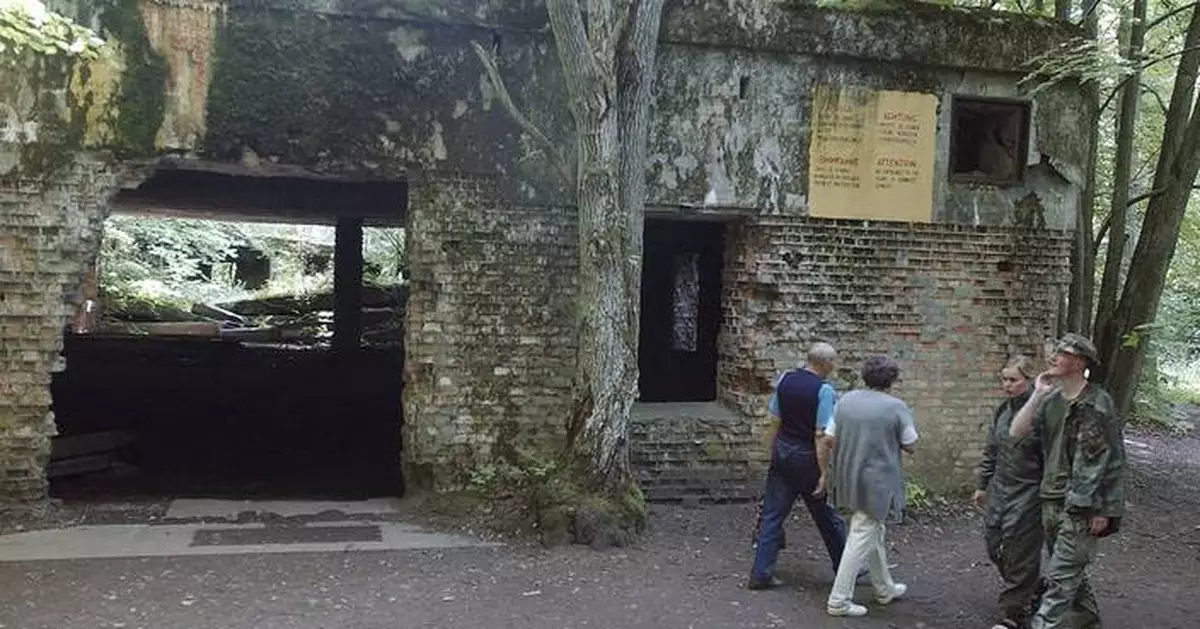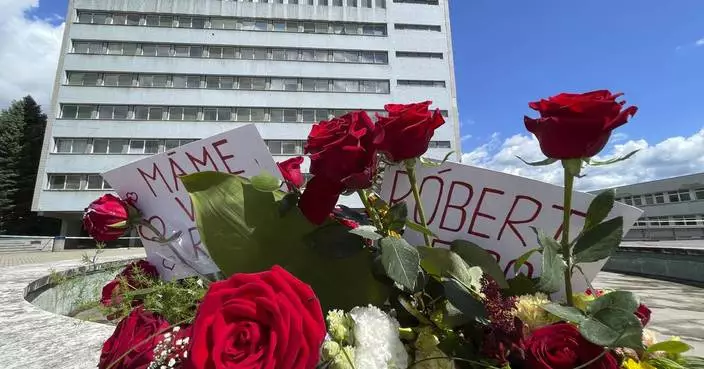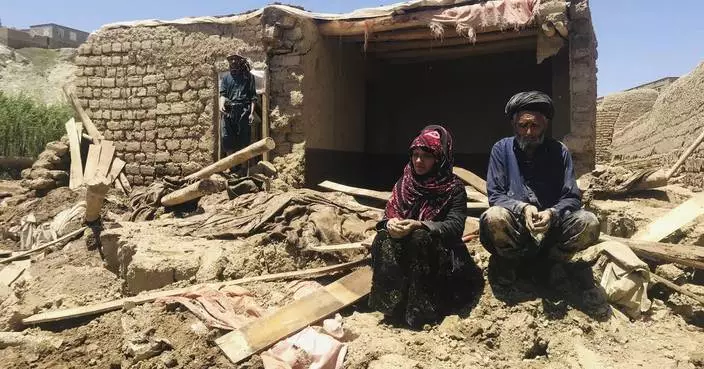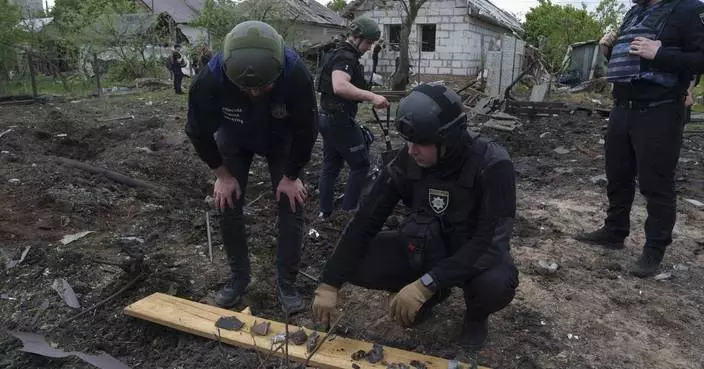WARSAW, Poland (AP) — Polish prosecutors have ended an investigation into human skeletons found at a site where German dictator Adolf Hitler and other Nazi leaders spent time during World War II because their advanced decay made it impossible to determine the cause of death, a spokesman said Monday.
The remains were found Feb. 24 at Wolf's Lair, which served as Hitler’s chief headquarters from 1941-44 when the area was part of Germany. The compound of about 200 Nazi bunkers and military barracks hidden in deep woods was the site of the failed assassination attempt on Hitler by Col. Claus Stauffenberg on July 20, 1944. The site is now a tourist attraction.
The spokesman for the prosecutor's office in nearby Ketrzyn town, Daniel Brodowski, said police officers secured the remains after they were found by a local group, Latebra, which searches for historical objects.
A forensic medical expert examined them under the supervision of the prosecutor's office, which was trying to determine if manslaughter had occurred. It discontinued the investigation in late March due to a lack of evidence that a crime had been committed, Brodowski told The Associated Press in an emailed statement.
“The expert stated that the preserved bone remains were of human origin and came from at least four people, three of whom were most likely middle-aged men, and the fourth was a child several years of age whose sex cannot be determined,” Brodowski wrote.
But due to advanced decay of the remains, it was no longer possible to determine the cause of death, he said, noting that at least several dozen years had passed.
The investigation didn't address who the people might have been, due to the conditions of the remains and passage of time.

FILE - Tourists visit the ruins of Adolf Hitler's headquarters the "Wolf's Lair" in Gierloz, northeastern Poland, July 17, 2004 where his chief of staff members made an unsuccessful attempt at Hitler's life on July 20, 1944. Polish prosecutors have discontinued an investigation into human skeletons found at Wolf's Lair where German dictator Adolf Hitler and other Nazi leaders spent time during World War II because the advanced state of decay made it impossible to determine the cause of death, a spokesman said Monday, May 6, 2024. (AP Photo/Czarek Sokolowski, File)
Using armored vehicles and backhoes to shove aside charred barricades, French security forces worked Sunday to retake control of the highway to the international airport in violence-scorched New Caledonia, shuttered because of deadly unrest wracking the French Pacific archipelago where indigenous people have long sought independence from France.
An eventual reopening of the Nouméa-La Tontouta airport to commercial flights could allow stranded tourists to escape the island where armed clashes, arson, looting and other mayhem have prompted France to impose a state of emergency. The airport, with routes to Australia, Singapore, New Zealand and other destinations, closed Tuesday as protests against voting reforms opposed by pro-independence supporters degenerated into widespread violence, leaving a vast trail of destruction.
French Interior Minister Gérald Darmanin, posting on social media platform X, said the “major operation” was “aimed at fully regaining control” of the RT1 highway between the capital, Nouméa, and the airport 60 kilometers (nearly 40 miles) to the northwest. He said more than 600 gendarmes were deployed. The number spoke to the difficulty of clearing roads of charred debris and barricades erected by pro-independence demonstrators and residents who have banded together to try to protect homes and livelihoods against rioters and looters.
The police effort to reopen the airport road cleared nearly 60 barricades on its first day, French authorities in New Caledonia' posted on X.
The French High Commission, in a statement, described the night of Saturday to Sunday as “calmer" but still spoke of two blazes and the looting of a gas station, without giving details. A 6 p.m. to 6 a.m. curfew is in effect and security forces have been granted emergency powers, including house detention for people deemed a threat to public order and expanded leeway to conduct searches, seize weapons and restrict movements, with possible jail time for violators.
The High Commission also said 230 people it described as rioters have been detained.
Nouméa’s mayor, Sonia Lagarde, told French broadcaster BFMTV on Sunday that fully clearing the airport road could take “days and days” because of "an enormous amount of burned carcasses of cars.”
“The situation is still dramatic,” she said.
Gen. Nicolas Matthéos, head of the archipelago’s public order force of gendarmes, said some barricades had been booby-trapped with gas canisters and reinforced with “walls of vehicles."
On Saturday, French authorities reported a sixth fatality in the violence, following an exchange of gunfire at a barricade in the north of the main island, at Kaala-Gomen.
There have been decades of tensions between indigenous Kanaks seeking independence and descendants of colonizers who want to remain part of France.
The unrest erupted Monday as the French legislature in Paris debated amending the French constitution to make changes to New Caledonia voter lists. The National Assembly in Paris approved a bill that will, among other changes, allow residents who have lived in New Caledonia for 10 years to cast ballots in provincial elections.
Opponents fear the measure will benefit pro-France politicians in New Caledonia and further marginalize Kanaks who once suffered from strict segregation policies and widespread discrimination.

FILE - Smoke rises during protests in Noumea, New Caledonia, Wednesday May 15, 2024. Using backhoes to shove aside charred vehicles, French security forces worked Sunday, May 19, 2024, to retake control of the highway to the international airport in violence-scorched New Caledonia, shuttered because of deadly unrest wracking the French South Pacific island where indigenous people have long sought independence from France. (AP Photo/Nicolas Job, File)

FILE - This handout photo provided by the French Army shows security force embarking a plane to New Caledonia at the Istres military base, southern France, on Thursday, May 16, 2024. Using backhoes to shove aside charred vehicles, French security forces worked Sunday, May 19, 2024, to retake control of the highway to the international airport in violence-scorched New Caledonia, shuttered because of deadly unrest wracking the French South Pacific island where indigenous people have long sought independence from France. (Etat Major des Armees via AP, File)












